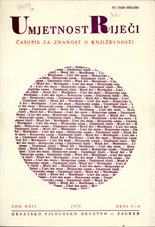Naša narodna epika kao argument u homerskom pitanju
Our Folk Epic as the Argument in Homeric Question
Author(s): Miroslav KravarSubject(s): Language and Literature Studies
Published by: Hrvatsko filološko društvo
Summary/Abstract: In the preceeding paper, the adapted and expanded extract from alecture held on three occasions under the title Homer und die serbo-kroatische Volksepik (1961-1963) and published in the meantime (1962), I intend to answer the following question: What can Serbo-Croatian oral epic poetry, which is here and there still sung, give us in order to understand better the Homeric epic, which has come down to us - like other poetic works of antiquity - by written tradition in a more or less artistically elaborate form? Such a question presupposes a possibility of comparing two rather unequal quantities, i. e. two great epic poems and some cycles of heroic songs. Nevertheless, such a comparison obtrudes itself so much the more since the relation between epic song and great epic has repeatedly played a very important part in the Homeric criticism. At the beginning of the XIXth century, after J. G. Herder in his various collection Volkslieder (1778-1779) or Stimmen der Volker in Liedern (1807) had acquainted the cultured Europe with products of »folk« poetry of a whole series of peoples, the idea of the possibility of a comparative study of the Homeric poems in the light of oral epic poetry was already more or less mature. Such an idea soon found a number of adherents in the South-Slavic countries who exerted themselves in the analytic comparative work in search of famous »common traits« in the Homeric poems and in Serbo-Croatian oral epic poetry. Many Croatian and Serbian scholars succeeded each other in this kind of research. For the rest, it is above all thanks to its literary fortune that Serbo-Croatian oral poetry has won such an eminent place in this domain of comparative studies: there are many others to compete for the same dignity. Setting aside in this paper the many times treated questions of common traits with regard to the epic matter and style, I dwell more specially upon facts in which more or less deep discrepancies between the two traditions come to light. It is above all the sphere of the poetic technique which, far from being exhausted in the »oral technique« of the American Parry-Lord's school, refers at first to the great traits of composition of the epic work, whether song or poem. In this connection, some well visible differencies between the Homeric epic poem and the Serbo-Croatian epic song deserve to be pointed out. First of all, it is the extent of the epic work on which many things depend in the composition of the subject. In this respect, the longest oral song is no match for the immensity of the Homeric poems. Even the long songs of the Harvard collection on which the oral theory leans seem to be but expanded creations which do not reach the inner volume of the Homeric epic. Then, there is the question of the style of narration: whereas the folk singer in the framework of related facts mentions, the Homeric poet paints.
Journal: Umjetnost riječi
- Issue Year: 1978
- Issue No: 3-4
- Page Range: 87-119
- Page Count: 33
- Language: Croatian
- Content File-PDF

